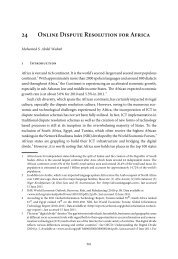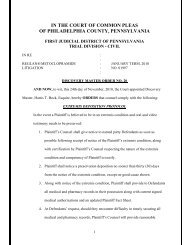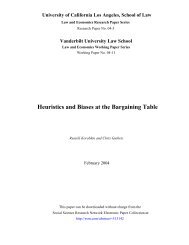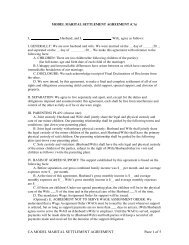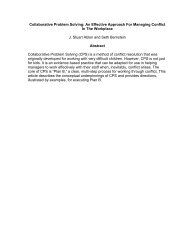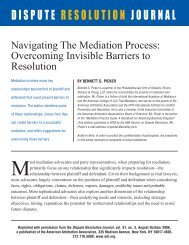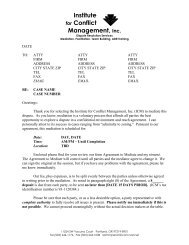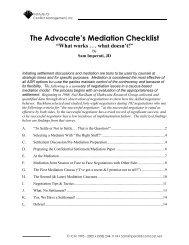- Page 1 and 2: ACTES PROCEEDINGS ACTAS 1
- Page 3 and 4: Coppola de vanna Anna - Al di la’
- Page 5 and 6: Stimec Arnaud - Contribution à l
- Page 7 and 8: Palabras de Presentación del Presi
- Page 9 and 10: cuando al inaugurar la Conferencia
- Page 11: sobre un tema crucial y determinant
- Page 15 and 16: narrative structures organising the
- Page 17 and 18: indigenous/non-indigenous, Asian/Ca
- Page 19 and 20: "steer rather than row," and to be
- Page 21 and 22: and are used to loosely to describe
- Page 23 and 24: In opposition to the assumption tha
- Page 25 and 26: when they are used in some organisa
- Page 27 and 28: Okun, B., Fried, J., & Okun, M. (19
- Page 29 and 30: Family Mediation and Violence again
- Page 31 and 32: inadequate and blameworthy” in re
- Page 33 and 34: terrorism” to describe male viole
- Page 35 and 36: • In Australia the vast majority
- Page 37 and 38: A number of Australian studies have
- Page 39 and 40: Emotional abuse, threats and intimi
- Page 41 and 42: which was completed in June 1996. 6
- Page 43 and 44: efore deciding whether or not to pr
- Page 45 and 46: groups with the current conservativ
- Page 47 and 48: nature of the event, the perceived
- Page 49 and 50: should be conducted in a way that e
- Page 51 and 52: Mise en place et évaluation d’un
- Page 53 and 54: CONFERENCE 47
- Page 55 and 56: The Reflexive Mediator: Theory and
- Page 57 and 58: practices are culturally specific (
- Page 59 and 60: • use an “inside-out” approac
- Page 61 and 62: mediation process to put dissonance
- Page 63 and 64:
References Brookfield, S. D. (2000)
- Page 65 and 66:
2. La FNSEA&SNAE L’agriculture fr
- Page 67 and 68:
5 - Les perceptions des médiateurs
- Page 69 and 70:
Sur la question de savoir qui a fai
- Page 71 and 72:
préoccupations ou nouvelles probl
- Page 73 and 74:
Mediation as a parallel process to
- Page 75 and 76:
Since a typical Workplace Assessmen
- Page 77 and 78:
• How the other party will be app
- Page 79 and 80:
• Employees that appear to be aff
- Page 81 and 82:
needs follow firmly the agenda they
- Page 83 and 84:
Mataró Mataró es una ciudad de po
- Page 85 and 86:
La mediación comunitaria Conceptua
- Page 87 and 88:
Experiencias A lo largo de 2003 est
- Page 89 and 90:
De aquí podemos extraer que la med
- Page 91 and 92:
Todo eso se consigue poniendo en ju
- Page 93 and 94:
Mediazione Sociale e Sicurezza urba
- Page 95 and 96:
• Promuovere e diffondere tra i c
- Page 97 and 98:
quartiere che possono prendere vari
- Page 99 and 100:
Kuhn conteste la notion conventionn
- Page 101 and 102:
Il semble alors pertinent postuler
- Page 103 and 104:
pénal traditionnel qui, à la diff
- Page 105 and 106:
La justice réparatrice : un change
- Page 107 and 108:
En guise de conclusion : La « dév
- Page 109 and 110:
MORIN, E. (1991). La méthode. Les
- Page 111 and 112:
Selon le Professeur Guy ROCHER 97 ,
- Page 113 and 114:
La médiation n’appelle pas à l
- Page 115 and 116:
Secondo il Professor Guy ROCHER 102
- Page 117 and 118:
costume, di buona educazione, filos
- Page 119 and 120:
Laut Professor Guy ROCHER 109 verla
- Page 121 and 122:
Die Behauptung des Professors Jean
- Page 123 and 124:
La madre è molto stanca, G. reclam
- Page 125 and 126:
le proprie verità e quelle degli a
- Page 127 and 128:
La incomunicabilità tra generazion
- Page 129 and 130:
Eppure il professor Marescalchi dev
- Page 131 and 132:
égion ont contribué efficacement
- Page 133 and 134:
scellée par des sacrifices d’ani
- Page 135 and 136:
pour être efficace, doit se faire
- Page 137 and 138:
Mediación frente a las problemáti
- Page 139 and 140:
Si bien este no es un trabajo que f
- Page 141 and 142:
MEDIACION ES UNA HERRAMIENTA PARA Q
- Page 143 and 144:
Otro tema importante a considerar e
- Page 145 and 146:
El acuerdo entre 2 vecinos por el u
- Page 147 and 148:
Después de cumplido el Acuerdo, Ju
- Page 149 and 150:
contemplar, analizar y respetar la
- Page 151 and 152:
El proceso judicial clásico sufre
- Page 153 and 154:
La mediación en las organizaciones
- Page 155 and 156:
Para que este proceso opere es impo
- Page 157 and 158:
mediador a través de preguntas cir
- Page 159 and 160:
5. Continuo Mi habla se extiende en
- Page 161 and 162:
nueva mirada a la situación. En es
- Page 163 and 164:
L’Expérience en Médiation - ré
- Page 165 and 166:
Tableau 2 : médié libre de venir
- Page 167 and 168:
La résolution de conflit passe par
- Page 169 and 170:
Tableau 11 : point positif malgré
- Page 171 and 172:
permettant de recadrer le conflit ?
- Page 173 and 174:
nouvelles icônes : manifestations
- Page 175 and 176:
Win:Win:Win WIN:WIN la gestion des
- Page 177 and 178:
‣ Dans le Rouge_Egocentrique : le
- Page 179 and 180:
Podemos hablas acerca de la interdi
- Page 181 and 182:
es donde debe insertarse la Mediaci
- Page 183 and 184:
Si solo una disciplina científica
- Page 185 and 186:
La comunidad de intereses profesion
- Page 187 and 188:
Asimismo estas organizaciones, como
- Page 189 and 190:
Concomitantemente se debería inten
- Page 191 and 192:
in at least twenty different countr
- Page 193 and 194:
questioning. Sometimes know as refl
- Page 195 and 196:
Questions Between the Past & Future
- Page 197 and 198:
LA PROPUESTA En este convencimiento
- Page 199 and 200:
Eso mismo puede ser trabajado en el
- Page 201 and 202:
The intercultural mediator: persona
- Page 203 and 204:
Shared goal (joint goal) Interagent
- Page 205 and 206:
differences which can be found betw
- Page 207 and 208:
desires, including implicit desires
- Page 209 and 210:
taking for granted what is actually
- Page 211 and 212:
BENADAVA, S. (1989), “La mediaci
- Page 213 and 214:
La obra construida ________________
- Page 215 and 216:
satisfacciones. La pobreza puertas
- Page 217 and 218:
aproximaciones al tiempo que vendr
- Page 219 and 220:
A dynamic approach to mediation and
- Page 221 and 222:
A specific feature of training thus
- Page 223 and 224:
- d’une part, de reconnaître l
- Page 225 and 226:
4. Utilisation de la médiation dan
- Page 227 and 228:
E. Conséquences En cas d’échec,
- Page 229 and 230:
Tentativi di agire direttamente sul
- Page 231 and 232:
La peculiarità della “soluzione
- Page 233 and 234:
- l’alterazione dei feedbacks rel
- Page 235 and 236:
Il Mediatore raggiunge tale risulta
- Page 237 and 238:
Development of Commercial Mediation
- Page 239 and 240:
2.2 Mediation in tribunals, governm
- Page 241 and 242:
appoints two mediators to the case
- Page 243 and 244:
whether a mediation process is perc
- Page 245 and 246:
conducive environment, mediator imp
- Page 247 and 248:
8. Future of Commercial Mediation i
- Page 249 and 250:
In particular, SMC has been engaged
- Page 251 and 252:
Victim offender mediation is a co-o
- Page 253 and 254:
Position face au conflit et médiat
- Page 255 and 256:
Les types de résolution de conflit
- Page 257 and 258:
Prénom Âge Profession Statut Form
- Page 259 and 260:
• la promotion de la médiation (
- Page 261 and 262:
Réponse positive inconditionnelle
- Page 263 and 264:
Valentine dont les deux attitudes d
- Page 265 and 266:
termes de gagnant-gagnant. Elles en
- Page 267 and 268:
A. Présentation du contexte Le lit
- Page 269 and 270:
La durée de l’arbitrage, si elle
- Page 271 and 272:
Dans la médiation, les parties tro
- Page 273 and 274:
Il mobilise des relais actifs appel
- Page 275 and 276:
Collaborative Conversations: the st
- Page 277 and 278:
Achievements since 1st September 20
- Page 279 and 280:
During the workshops we used graphi
- Page 281 and 282:
o National mediation organisations
- Page 283 and 284:
Conflicts of Interest A mediator sh
- Page 285 and 286:
Un cambio de paradigma en la gesti
- Page 287 and 288:
El objetivo general del Proyecto fu
- Page 289 and 290:
Epistemological analysis and compar
- Page 291 and 292:
contradiction with the community of
- Page 293 and 294:
What does a fair judgement mean? Is
- Page 295 and 296:
starting-point of the other process
- Page 297 and 298:
Parties themselves make a decision
- Page 299 and 300:
Participation of parties in the dec
- Page 301 and 302:
In the first column typical items o
- Page 303 and 304:
References Baruch Bush A., R., Folg
- Page 305 and 306:
Para Forster “pensar los aconteci
- Page 307 and 308:
La felicidad (eudaimonia) es el bie
- Page 309 and 310:
The Importance of Co-Mediation in m
- Page 311 and 312:
The demand that reaches the Judicia
- Page 313 and 314:
differentiation of logical types in
- Page 315 and 316:
By favouring the conciliatory model
- Page 317 and 318:
- the parties always communicate th
- Page 319 and 320:
FINAL CONSIDERATIONS As has been se
- Page 321 and 322:
Contenidos 1. Fundamentos generales
- Page 323 and 324:
¿Cuales son las formas predominant
- Page 325 and 326:
comportamientos “antiguos”, arr
- Page 327 and 328:
Él me dice que está dispuesto a p
- Page 329 and 330:
Cornelius Castoriadis nos insta en
- Page 331 and 332:
• Resumen de actuaciones 1. Grupo
- Page 333 and 334:
• Resultados y conclusiones de lo
- Page 335 and 336:
• Acciones para la puesta en marc
- Page 337 and 338:
parent or relative, inheritance dis
- Page 339 and 340:
completely. They were now living se
- Page 341 and 342:
move away from linear cause-and-eff
- Page 343 and 344:
Paul Ros Ted Sue Jill Separated 4 m
- Page 345 and 346:
Política familiar no es lo mismo q
- Page 347 and 348:
problemas sociales, antes no recono
- Page 349 and 350:
mediación. De otro lado, las admin
- Page 351 and 352:
Así, no se puede relegar solo la m
- Page 353 and 354:
En los últimos años, se ha tomado
- Page 355 and 356:
REFERENCIAS BIBLIOGRÁFICAS FANTOVA
- Page 357 and 358:
The Verwall Natura 2000 mediation p
- Page 359 and 360:
Fig. 1: The procedure Mediation tea
- Page 361 and 362:
Second round of Drawing up draft ag
- Page 363 and 364:
step, after many difficult discussi
- Page 365 and 366:
Difficulties encountered and soluti
- Page 367 and 368:
No applications for paragliding in
- Page 369 and 370:
Sistemas de gerenciamiento de confl
- Page 371 and 372:
Campos de aplicación del SGC El á
- Page 373 and 374:
Public Mediation - Just Another Way
- Page 375 and 376:
political systems did. New case, ne
- Page 377 and 378:
For sure, everything should be very
- Page 379 and 380:
has to be verified in the next step
- Page 381 and 382:
Racisme et médiation, l’action r
- Page 383 and 384:
existant à ce jour en Suisse en ma
- Page 385 and 386:
Exemples de situations 1. Insultée
- Page 387 and 388:
médiation permettrait tant à la p
- Page 389 and 390:
Mediation for Mediators? Basic info
- Page 391 and 392:
*’Othre matters’ include family
- Page 393 and 394:
*Most of marital conflict-divorce c
- Page 395 and 396:
Introduction La médiation est si p
- Page 397 and 398:
C. Les relations individuelles du t
- Page 399 and 400:
de s’interroger sur le renforceme
- Page 401 and 402:
o Strong relationships among group
- Page 403 and 404:
Delincuencia y mediación Penal ___
- Page 405 and 406:
El derecho penal tiende hacia la co
- Page 407 and 408:
la exigencia de acudir a la medida
- Page 409 and 410:
Bibliografía Chouke F.H. Garantias
- Page 411 and 412:
ecuperando il concetto di complessi
- Page 413 and 414:
tutta la questione sicuritaria dent
- Page 415 and 416:
Ciò che da alcuni anni come gruppo
- Page 417 and 418:
Médiation comme un instrument qui
- Page 419 and 420:
Sur la base des éléments esquiss
- Page 421 and 422:
la loi de sa part. Dans un paradigm
- Page 423 and 424:
disposition par rapport à l'autre
- Page 425 and 426:
La Mediación y el ekeko o la perso
- Page 427 and 428:
atento, humildemente atento, a lo q
- Page 429 and 430:
Esa islita la construyen el ekeko y
- Page 431 and 432:
Me quedará siempre la duda de sabe
- Page 433 and 434:
Naissance d’une profession : le m
- Page 435 and 436:
Un développement rapide Sans repre
- Page 437 and 438:
indispensable à l’ouverture de c
- Page 439 and 440:
Pour dépasser cette situation, les
- Page 441 and 442:
Es importante resaltar que el modo
- Page 443 and 444:
diferentes voces, con el objetivo d


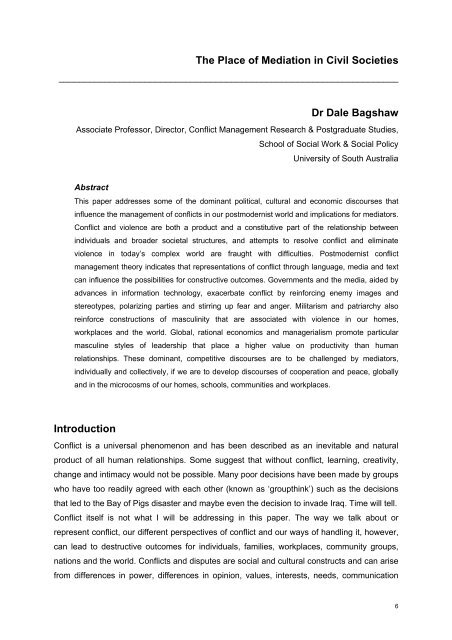
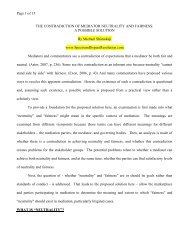
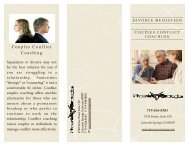
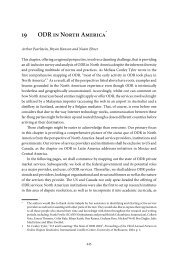
![Settlement Agreement Form [Agreement] - Mediate.com](https://img.yumpu.com/50682143/1/190x245/settlement-agreement-form-agreement-mediatecom.jpg?quality=85)

